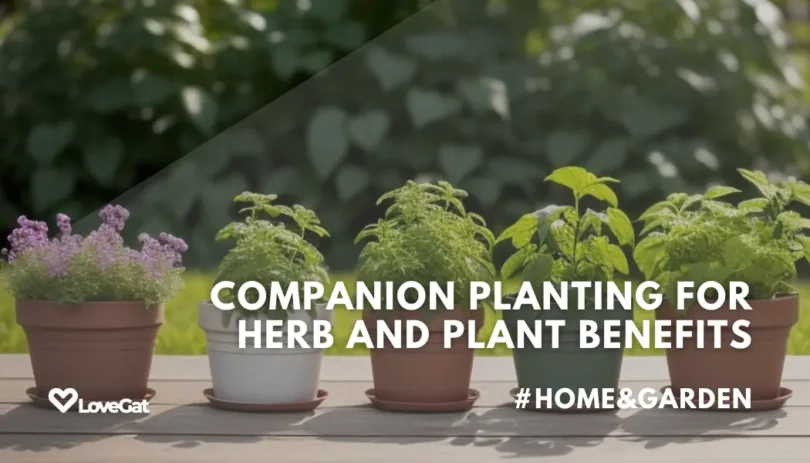Utilizing Companion Planting Strategies to Benefit Your Herbs and Other Plants!
Companion planting is a gardening technique that involves growing different plants together to maximize their mutual benefits and enhance overall garden health. By strategically pairing herbs with compatible companion plants, you can improve soil fertility, deter pests, attract beneficial insects, and increase yields. Let’s explore the art of companion planting and discover how it can benefit your herb garden and other plants.
Understanding Companion Planting
Companion planting relies on the principles of symbiotic relationships between plants, where each species provides unique benefits to its neighbors. Some plants release chemicals that repel pests or inhibit weed growth, while others attract pollinators or fix nitrogen in the soil. By selecting complementary plant combinations, you can create a harmonious ecosystem that fosters plant health and productivity.
Benefits of Companion Planting for Herbs
When it comes to herb gardening, companion planting offers numerous advantages:
-
Pest Control: Certain herbs, such as basil, marigold, and chives, emit natural compounds that repel common garden pests like aphids, mosquitoes, and cabbage moths. Interplanting these herbs with susceptible plants can help reduce pest damage without the need for chemical pesticides.
-
Attracting Beneficial Insects: Many herbs, including dill, fennel, and parsley, attract beneficial insects such as ladybugs, lacewings, and hoverflies. These insects prey on harmful pests like aphids, mites, and caterpillars, helping to keep pest populations in check and maintain ecological balance in the garden.
-
Improving Soil Health: Leguminous herbs like clover, alfalfa, and vetch have the ability to fix nitrogen in the soil, making it more available to neighboring plants. By interplanting nitrogen-fixing herbs with nitrogen-hungry plants like tomatoes or peppers, you can boost soil fertility and promote healthy growth.
-
Enhancing Flavor: Companion planting can also enhance the flavor and aroma of herbs by influencing their growth and development. For example, planting aromatic herbs like rosemary or thyme alongside vegetables can impart subtle flavors and aromas to the harvested produce, enhancing culinary enjoyment.
Companion Planting Strategies for Herbs
Here are some effective companion planting strategies for maximizing the benefits of herbs in your garden:
-
Planting Basil with Tomatoes: Basil and tomatoes are classic companions in the garden, as basil repels tomato hornworms and enhances the flavor of tomatoes when grown nearby.
-
Pairing Rosemary with Beans: Rosemary is known to deter bean beetles and enhance the growth of beans when planted together. The strong aroma of rosemary can also help mask the scent of beans, making them less attractive to pests.
-
Interplanting Chives with Carrots: Chives release chemicals that repel carrot flies, making them excellent companions for carrots. Planting chives alongside carrots can help protect them from pest infestations and improve overall yield.
-
Sowing Nasturtiums with Cucumbers: Nasturtiums are natural pest repellents and can deter cucumber beetles and aphids when planted near cucumbers. Plus, their vibrant flowers add beauty and color to the garden.
-
Growing Marigolds Around the Garden: Marigolds are renowned for their pest-repelling properties and can deter a wide range of garden pests, including nematodes, aphids, and whiteflies. Planting marigolds around the perimeter of the garden or between rows of vegetables can help protect neighboring plants from pests.
Companion planting is a valuable technique for enhancing the health, productivity, and resilience of your herb garden and other plants. By carefully selecting companion plants that complement each other’s growth habits, pest resistance, and soil fertility requirements, you can create a thriving garden ecosystem that benefits all its inhabitants. Experiment with different plant combinations, observe their interactions and enjoy the bountiful harvests and vibrant beauty that companion planting brings to your garden. Happy planting!
You Might Also Like
- How I used AI to create a living data visualization for our home
- 20 Cool Home Decor And Designs For Any Style
- Planning a garden? Here’s a step-by-step guide to start off on the right foot
Social Media Communities
Share your digital nomad experiences and connect with fellow Us:
- Instagram: @Lovegatofficial
- Facebook: @LoveGat
Your journey doesn’t end here. Continue to explore and share our Decor & Home Posts.







